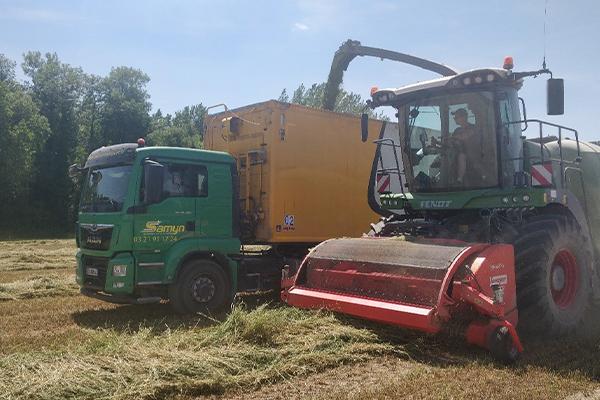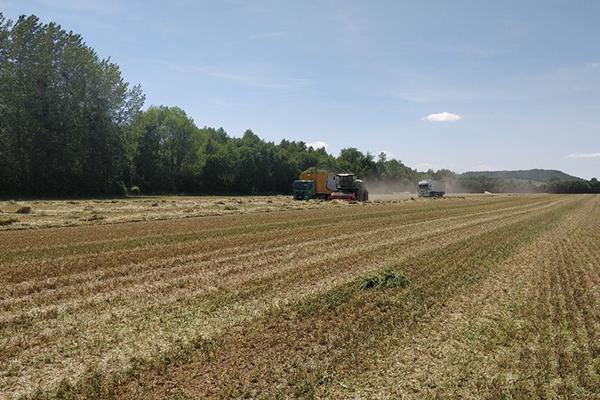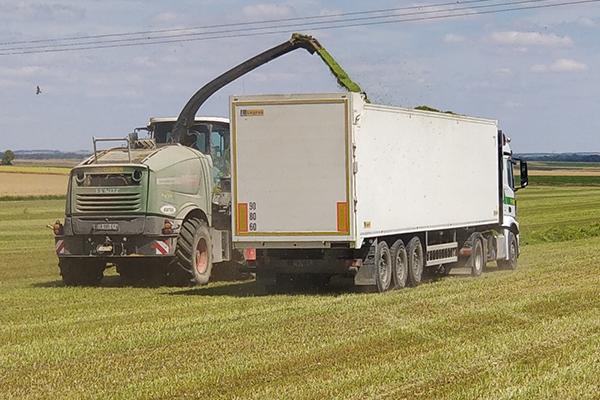"MY KATANA WORKS SIX MONTHS PER YEAR" TEXT MATHIEU BONAVENTURE - ETA MAG #14 FEBRUARY-MARCH-APRIL 2019
We are just a few weeks away from the start of the alfalfa harvest in Champagne, the first cradle of production in France. SAS Agrico, founded in 2016, is outfits equipment, including the Katana 65 forage harvester, the centerpiece of a fleet that is about to attack its third season. It already has more hours on its counter than many of its counterparts on the market, because it works six months non-stop, from the end of April to the end of October. No time to spare during the season, everything needs to work perfectly, with well-honed logistics.
An FWF (Farm Work Firm) dedicated 75% to the agriculture industry
In Connantre, in Marne, François Cousin is also at the helm of a transport company, CTS. Because of his ties to the manufacturers, he specialized in harvesting and digging up potatoes, carrots and beets. "When grubbing potatoes, we charge the farmer but we are very connected with the industry, says François Cousin. The industry’s needs punctuate our day's work. Even in carrots, it is not the farmer who calls us directly but the suppliers who need a specific volume. On the other hand, when pulling beets and during the harvests, it is handled in the traditional methods.
Also specializing in sewage sludge treatment, Agrico saw another opportunity, in 2017, with an organization to evolve aging equipment in alfalfa dehydrators. The fifth wheel articulated forage harvesters traditionally employed are rare in today’s market. As a result, a new organization is being set up. Agrico is positioning itself with a strong offering:
“We already had experience with alfalfa transport, but that year, we decided to offer our silage services. We offered them several solutions and they agreed to give us a surface of 1,200 hectares for silage and transport. We did not handle the cutting.”
"We discovered this business, both being entrepreneurs us and our client, who, for the first time, outsourced this job. After our trial round in 2017, we gained the opportunity to cut 2,500 hectares (to be multiplied by four annual cuts), or 3000 hours of mowing and just as much silage," said François. "We do not rest!” The particularity of the plant Agrico works for is that it harvests in "green", that is to say a product that is on average 20% dry matter. That's why the cutter does as many hours as the forage harvester. Otherwise, the hours would be much higher. "We have to cut and ensile at the same time. This green product is used to make feed but also to extract a hyperprotein product called PX. It is also used for animal feed supplement. "
Trucks and dumpers
"In itself, handling the silage was not the complicated part. It is more the logistic end that had to be managed and carried out in a new way ", specifies François Cousin. "We asked ourselves whether we should put the tractors back on the road and tested it out during the first year, for organizational reasons. This allowed us to define 12km as the critical point. Meaning that under that speed, a tractor can be as efficient as a truck. Beyond that, a truck is needed. Since our average work radius is 25 kilometers (the furthest distant parcels are 40 km away), the question did not even come up. Regardless, it was politically impossible to imagine putting tractors back on the road. Near Epernay, we have several towns to cross. The residents of those towns would not have liked it.” Regardless, an agricultural unit, with a moving floor trailer, is limited to 60 m3 and weighs nearly 10 tonnes, not counting the tractor. "With a truck with hydraulic assistance, we do not exceed 15 tonnes when empty. That means that with a 44 tonne overall maximum permitted weight we can load 29 tonnes of alfalfa. "

However, we had to adapt the system. For the 2017 season, Agrico opted for four-wheel drive trucks and a team of certified agricultural tires purchased in Germany. "Unfortunately, we had an accident related to a frame defect, which was identified by the manufacturer.” The company reduced their risks and backed down. They then went back to standard tires. "That's where we realized that, ultimately, they work pretty well, even on a four-wheel drive. Our latest trucks have a Poclain hydraulic assistance system, as efficient, less energy consuming and most importantly lighter than a mechanical All Wheel Drive," says François Cousin, who is always looking to optimize its loadings. "Between a standard AWD truck and an AddiDrive system, there is 500 kg difference, which represents 500 kg more payload!” With almost 10 rotations per day and per shift, 100 rotations at 29 tonnes per truck per week, that matters.

In perpetual reflection, Cousin’s goal is to make the field profitable and gain efficiency. For the 2019 season, he wanted to optimize unloading at the plant by acquiring four Legras 80 m3 road semitrailers. "We are familiar with moving floors, they are usually slow. The fast ones that we will use will have to unload in four minutes, compared to seven for a classic model. These dumpers are equipped with large wheels, steered axles and watertight doors.” According to François, to reach the same flow with agricultural tractors, it would be necessary to use at least 30% more capital. "Currently, we mobilize a minimum of four trucks per site, and a maximum of six, depending on organization and distance."
The limitation of the trucks is that in wet conditions, they tend to damage the ground. "In this case, we have a plan B. We pull our skips on a dolly behind a tractor. With big wheels, it is always ready to help.” François Cousin reassures himself: "On a dry year like last year, it was only needed for 150 hours, but it could be in high demand during a wet year."
A forage harvester for intensive use
François Cousin also had to equip himself with a forage harvester, preferably a reliable one! Because, according to his calculations, it cannot be immobilized for more than four hours during harvest time. He chose a 650 horsepower Fendt Katana 65, the only one in the region and the first to work in industrial alfalfa. However, he’s not going into completely unknown territory because he knows his dealer, located only a few kilometers away. "With Martel establishments, I know that I have responsive service and a motivated team. We could almost call day and night!" The second argument made for the machine at the time of the decision: a Fendt offers a replacement machine in case of unexpected inoperability. Two drivers are dedicated to the Katana and a third is dedicated to troubleshooting. Drivers operate the machine in 12-hour shifts from 7am to 7pm and vice versa. "Same tempo for other posts, mowing or skips. We take advantage of the arrival of the new team to refuel, maintenance and blow off the machines."
The Katana’s maintenance does not take more than fifteen minutes a day. "There are three lubricating nipples, the air filter to blow if necessary and that's it!” Cousin, who has also opted for an extended service contract at 5,000 hours, was delighted. "Nevertheless, we know that a machine can not make it the whole season without being serviced for a few days, to change the rotor and expeller knives, counter knives, feeder rollers bearings, etc. We know that halfway through, we need to stop. The first year, we had normal plates, but this year everything was converted to HD, from the entrance to the exit of the machine. It should hold for the whole season.”
Last year, the arrival of a Fendt prototype helped relieve the Agrico forage harvester. Despite a sealing problem in the feed rollers, and some breakages on the electric cylinder used for the automatic adjustment of the counter-knife automatic adjustment, Agrico was satisfied with his choice, to the extent that they will repeat their purchase. "Lending us a machine was not a permanent fix. We decided to buy a second. The one will also be harvesting biogas for some local facilities. Next year we will reverse the workload. The oldest, which will have 6,000 engine hours, will then become a back-up machine."
Source - ETA Mag « Ma Katana travaille six mois par an » extract of n°14 - Février-Mars-Avril 2019 du magazine.

